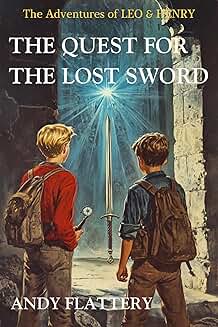As a boy, I was a voracious reader. I don’t know how many Hardy Boys books were published by the time I outgrew them, but I had probably read most. (But in a public library I frequently haunted, I discovered The Three Investigators, which I liked even better.) Tom Swift and His Rocket Ship is a book I have managed to hang onto over the decades, and sits on my shelf today.
As a poster child for Generation X, I would trade childhoods with a dude from pretty much any other generation. However, one advantage my cohort had over the Millennials and Homelanders was that masculinity wasn’t considered “toxic” in the mainstream back then. You could still find literature for boys and men on store shelves. Boys today are mostly outa’ luck.
Mostly, but not completely outa’ luck, because small publishers like Raconteur Press and authors like Andy Flattery are producing books specifically for boys. Flattery set out to create a sort of pastiche of the Hardy Boys, Tom Swift, and young Indiana Jones. I’ve heard that imitation is the most sincere form of…wait for it…Flattery.
Couldn’t resist.
Quest for the Lost Sword is a lightning-quick read for an adult. The author does not take much time at all setting up the mystery. It’s all bang, bang, boom, done. Which may be perfect for the preteen and early teen demographic (which Leo and Henry, the two young protagonists, fit). The more I ponder it, the more I believe a story of this length and pace might be the perfect gateway to literature for boys.

Our two young heroes are growing up in a stable, traditional Catholic family. Their father is a globetrotting antiquarian, while their mother seems to be a stay-at-home mom. Their house is an historic building with a secret hideout underneath. The parents are a bit indulgent–trusting the boys to behave as responsibly as adults most of the time. In other words, the Kelly boys have a nearly ideal childhood.
Their priest comes to visit one day while Mr. Kelly is away on business. A family heirloom–the titular sword–has been stolen, after being in the priest’s family for centuries. The sword (and some other items) are spiritually charged objects–so there is a touch of the supernatural to the story.
Don’t ask me how the boys are able to book and pay for an international flight, but after dredging up a clue from an old Latin book, they are off to Europe to find and recover the sword. Their bravery and resourcefulness will be put to the test there, because there are people who don’t want the boys to succeed.
This story is simple, yet fantastical. As such, it’s a good one for boys. If you know a young boy, particularly one who doesn’t voluntarily read yet, buy him this book. It could just repair some of the damage public education has wreaked on the male of the species.
And speaking of all that, my Paradox series had a similar purpose, though the target audience is more young men than boys, after the first book.
